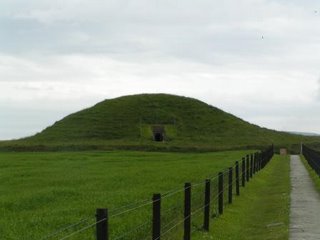Blackenings and the 4000+ year old room

Our first stop once in the Orkneys was to Maes Howe, the oldest and best preserved open cairn. It probably never would have been excavated except that the Vikings looted it long ago by breaking through the roof in the 1200’s. The embarrassment they’ll never know is that they completely missed the secret entrance concealed behind a boulder.
750 years later, a farmed figured out what was on his property, and suddenly
First we tried a local pub with a splendid view of the Ring of Brodgar. The door had the curious sign “No Blackenings” on it in the form of a handwritten note. In
The security of the Maes how was rather grand and I couldn’t help but think unnecessary. They had at least two fences encircling it, one of them with 5 strings of barbed wire. I can only imagine their primary concern was keeping out sheep, dogs, and sheepdogs, but perhaps the occasional trespasser as well.
The entrance to Maes Howe was arguably the most amazing part. The long tunnel-like entrance into the main chamber was of a size usually reserved for midgets. Even a hobbit like myself had to bend over as far as hobbitly possible to walk through them. This is not a design flaw, nor a sign that the designers were much shorter than you and I. The truth is much more impressive.
Every year on the winter solstice, and only on the winter solstice, the setting sun’s rays pierce through the length of the tunnel to shine, not in the main chamber, but through the main chamber and into the back wall of the smaller chamber past it. Built 5000 years ago, before any known written language or indeed any calendar in the region, it’s quite a feat.
Being in the main chamber itself casts an atmosphere that even a sardine packed group of tourists couldn’t spoil. The large room held an ancient, ominous, and above all calming feeling. Meditating there for just a moment, even standing shoulder to shoulder with strangers, was enough to feel utterly engulfed in the room. Then again, that might just have been a lack of sleep. Either way, I was very effected by the feeling.
Along the walls, written mostly in runic (and by written I mean carved into the stone). There were stories, family histories, bragging (“Helga is the most beautiful woman in the land”), sexual bragging (Broch was very good, Helga says so!”) , and just the plain old “Helga was here” ruins. Okay, if you hadn’t guessed by now, Helga’s the only name I remember from the translated ruins. In any case, ruins were carved all over the place and along the walls were a few well known drawings. Such drawings I later saw depicted in jewelry, paper drawings, shirts, and other crafts.
Viking text mentions their looting of Maes Howe which evidently has archeologists puzzled. The texts say that the Vikings took lots of treasure from the tomb. But the Viking’s notion of treasure was almost exclusively silver and gold, and historians agree that nothing like that could have been in the cairn. But the Vikings were proud people, and historian’s best guess is that the “treasure” the Vikings foface with ther peers. It wouldn’t have been a victory to brag to their peers the tale of how they spent half a day breaking into a big hill to find a bunch of bones.
After Maes Howe, we went to find our B&B and settle in before dinner. We departed again a deal later for a restaurant named Dunsby. My father had pessimistically proposed that perhaps the Orkney Brewery made their proud product only for exporting purposes, and thus could not be found on tap.
Lo, and behold, a grin spread across everyone’s face (well maybe not Scott’s) when we discovered that indeed, Dark Island is sold on tap – pints all around! It was splendid. It was less chewy than the bottles I’ve had, perhaps this had to do with freshness, or perhaps this was simply a difference in containment. Second pints were had by all except mom that night, following splendid food that, as usual, I am not going to touch on. I had reached the next step of my pilgramage.

0 Comments:
Post a Comment
<< Home